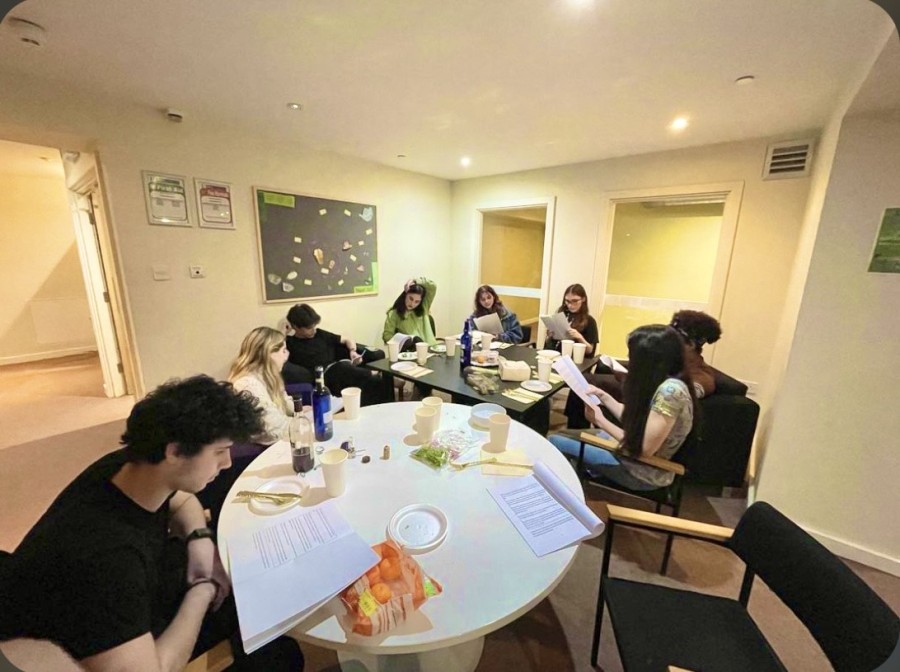How NYU London students celebrated Passover
Living abroad allows students to find unique ways to celebrate Passover while joining new communities.
Students at NYU London abroad hosted their own Passover seder. (Courtesy of Benjamin Schnirman Barría)
April 17, 2023
For many students studying abroad, celebrating holidays looks very different than it does at home. This Passover, which took place from April 5 to April 13, Jewish students at NYU London made being abroad part of their celebration, whether hosting their own celebrations or traveling for Passover program.
The Seder, the traditional Passover meal literally meaning “order,” is one of the most important aspects of the holiday and includes reading, drinking, telling stories and asking questions. The emphasis of the Seder dinner is to tell the story of how God took the Israelites out of Egypt.
LS first-year Jada Immanuel, who hosts a Shabbat dinner every Friday with Stern first-year Maddie Weber, is no stranger to celebrating Jewish traditions while abroad. For Passover, Immanuel held a Seder in the TV room of NYU London’s Byron Court with Weber and LS first-year Benjamin Schnirman Barría, after weeks of preparation.
“It was a difficult but rewarding process,” Immanuel said. “It was tedious, strenuous, and everything in between, but the reward of seeing students and friends seated around the table together filled my heart.”
Passover, or Pesach, is one of the Jewish religion’s most sacred and widely observed holidays. In Judaism, Passover commemorates the story of the Israelites’ departure from ancient Egypt where they had been enslaved. Jewish people observe the weeklong holiday with a number of important rituals, such as the removal of leavened products from their homes or the substitution of matzo for bread and the retelling of the Exodus tale.
Immanuel began her preparations by communicating with her mom before spring break to arrange bringing a Seder plate, which holds various symbolic foods and objects used throughout the meal, and a Haggadah, a Jewish text that sets forth the order of the Passover Seder, from her home to London. After days of meetings and communication with NYU London faculty and staff, Immanuel confirmed the Wednesday night Seder and prepared to host 20 people. NYU London students traveled to the Golders Green neighborhood to buy specific kosher groceries from Kosher Kingdom, and then spent hours preparing wine, grape juice, pot roast, haroset, latkes and chicken schnitzel.
Still, hosting the Seder in a common space came with its own set of difficulties, as the meal overlapped with a poker night event. Students partaking in the poker night were eating food meant for the Seder, according to Immanuel.
“Anyone is welcome to join, but the assumption was to partake in the Seder with respect, not just coming for drinks or food,” Immanuel said. “When we were finally able to sit down together and begin to recite the Haggadah, it went well. Ben had made an abridged version of the Haggadah and it was nice. It really felt like a community.”
Instead of remaining on campus, CAS sophomore Kineret Leben, like some other Jewish students, decided to take part in a Passover program. She traveled to Morocco where, in exchange for her work as a counselor at a day camp for kids in Jewish families, the camp paid for her flights, hotel and kosher food prepared for the holiday.
“Many religious Jewish students are leaving London because there are very intense cleaning processes, such as ridding the house of any crumbs, or making all of the dishes kosher [for Passover], with one method being boiling,” Leben said.
Like Leben, Gallatin junior Talya Rockland worked at a Passover program in Italy. Wanting to take advantage of already being in Europe, she decided to travel and celebrate with a new community.
“It’s amazing to meet Jewish people from all over the world,” Rockland said. “And the food is amazing, of course.”
Despite not being at home, NYU London students found a way to celebrate Passover in new ways and with new people.
“My favorite part would have to be the conversations we had after the service ended, after we opened the door for Elijah,” Immanuel said, referring to a Seder tradition. “We were all hanging out and talking, laughing. The Seder lasted until about one in the morning. It felt like a family coming together.”
Contact Emma Gorin at [email protected].



























































































































































